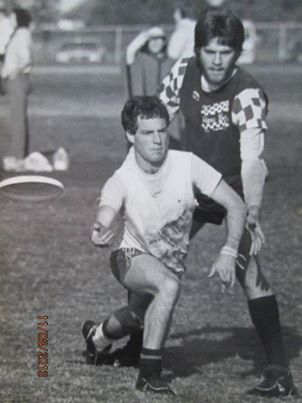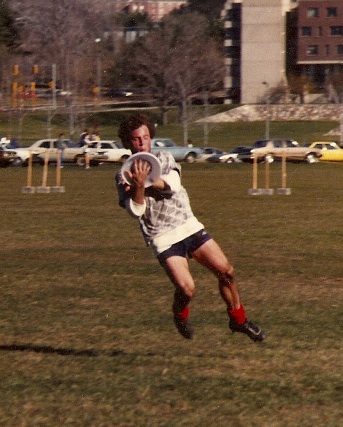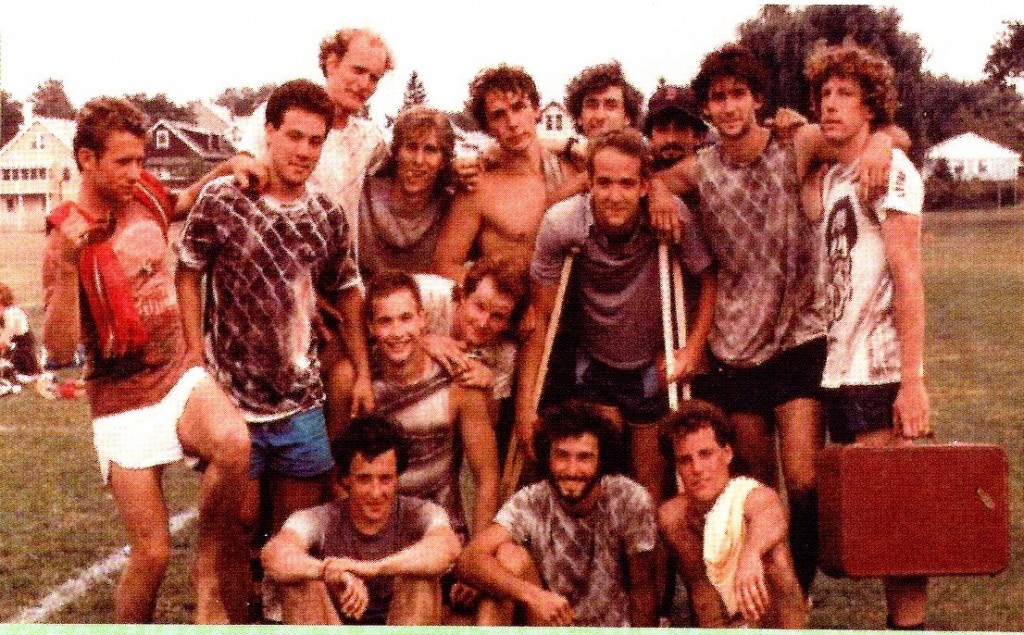My Hall-of-Fame Brother
categories: Cocktail Hour
1 comment
 As those who read this blog regularly know, I spent twenty years playing ultimate Frisbee. (At last check, 26,000 readers had at least browsed our Bill and Dave’s essay, “Ultimate Glory,” which was noted in this year’s Best American Sports Writing anthology.)
As those who read this blog regularly know, I spent twenty years playing ultimate Frisbee. (At last check, 26,000 readers had at least browsed our Bill and Dave’s essay, “Ultimate Glory,” which was noted in this year’s Best American Sports Writing anthology.)
The best thing about the sport, hands down, was getting to be good friends with so many teammates, and two weeks ago one of my teammates, David Barkan, was inducted into the Ultimate Hall of Fame. Ten members of our former team, the Hostages, made it down to Texas for the ceremony. I did not make it but sent along this letter:
He was my first real Frisbee hero.
Others can talk about David Barkan’s long career on the West Coast, his contributions to international Ultimate, and I am a great admirer of these. But it is the early blaze that interests me. That first sighting of this intense guy sprinting around the field, jumping and running and even pivoting faster than anyone else, like some high speed Star Trek creature who moved too fast for the crew to see. I would wager that he still holds the land speed record for the time between conceiving of a huck and the moment the disc left his hand.
 Back then Frisbee was still just coming out of its Neolithic Hippie period (I played barefoot my first year), but while David might wear Birkenstocks with socks off the field, there was no hippie to his game. I loved that. He threw himself into the sport with the intense passion of a Nadal. Even in making a simple catch he was so clearly himself: popping in the air and pancaking a chest high disc, his hands would come together on either side of the plastic with an emphatic slap as if to say “This is mine.” And it most often was, even when he went up against much taller players. There was no mistaking it: this guy wanted the disk, was hungry for it. Others might loll groovily around the field in a stoned haze. Not Mr. Barkan who, whether he was running or cutting or or hucking his backhand deep, did so with a purpose. That he cared about not just winning, but playing the sport in a daring and brave fashion, was plain for all to see.
Back then Frisbee was still just coming out of its Neolithic Hippie period (I played barefoot my first year), but while David might wear Birkenstocks with socks off the field, there was no hippie to his game. I loved that. He threw himself into the sport with the intense passion of a Nadal. Even in making a simple catch he was so clearly himself: popping in the air and pancaking a chest high disc, his hands would come together on either side of the plastic with an emphatic slap as if to say “This is mine.” And it most often was, even when he went up against much taller players. There was no mistaking it: this guy wanted the disk, was hungry for it. Others might loll groovily around the field in a stoned haze. Not Mr. Barkan who, whether he was running or cutting or or hucking his backhand deep, did so with a purpose. That he cared about not just winning, but playing the sport in a daring and brave fashion, was plain for all to see.
I mentioned his backhand hucks but I have to pause here and give special mention to the Barkan forehand. I do so selfishly because I tried to steal it and make it my own. I barely had a forehand in college, but I was smart enough to recognize a great one when I saw it. These were the days of the lazy floaty flick, soft parabolas around players, with no snap to them. But here came Barkan. With his forehand the essential motion was a sharp downward chop, as if rolling dice, and the disk came zipping out. I noted that and spent a summer on Cape Cod reconstructing my own forehand along Barkanian lines, forcing my brother to stand down the road for hours and catch thousands of throws. Barkan’s was a modern forehand really, and he was a modern player: faster than anyone out there, intent on winning, not fucking around, at least not during the games.
I don’t know what Ultimate is like now but back then there were few upsets: you lost to who you were supposed to lose to and beat who you were supposed to beat. And then the Hostages came along and changed all that. Didn’t these scraggly losers understand their role? It was clear where the Rude Boys were headed: to the front of the line. But on first glance the Hostages, rag tag and not particularly physically imposing, belonged somewhere in the middle. And then they started beating everyone. First they won April Fools, then Easterns, then, to everyone’s astonishment, Regionals. That victory brought the joy of shock to northeast Frisbee fandom. And it was Barkan who was the David to the Rude Boy’s Goliath. He was a leader on a team that sneered at leaders.
Today is about a great and fitting tribute to David Barkan but as he would be the first to admit, it is also about a team. A team that he helped form and that in turn helped form many of our lives. So this is a toast to David but also to his team. Mockery and humor were key tools in being a Hostage, with no opportunity to take yourself seriously. They still are. Sometimes you felt as if you were back in junior high school, but you always felt a sense of belonging, of deep friendship. It turns out that the team that Barkan helped create is a lifelong one. For all my memories of individual plays and individual moments, it is the ritual before the games that I always come back to.
That moment when the team that Barkan both led and was part of would gather together and say, as if in one voice, “May our passes be linked as our arms are now.”



Please add me to your distribution list.
Thanks.